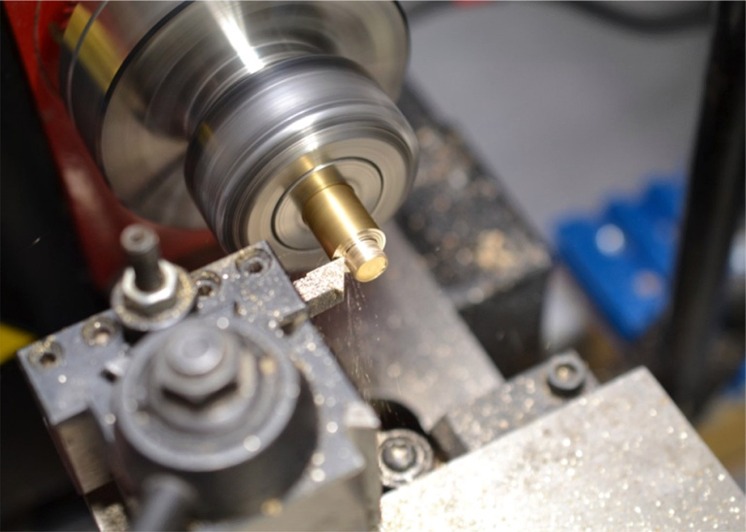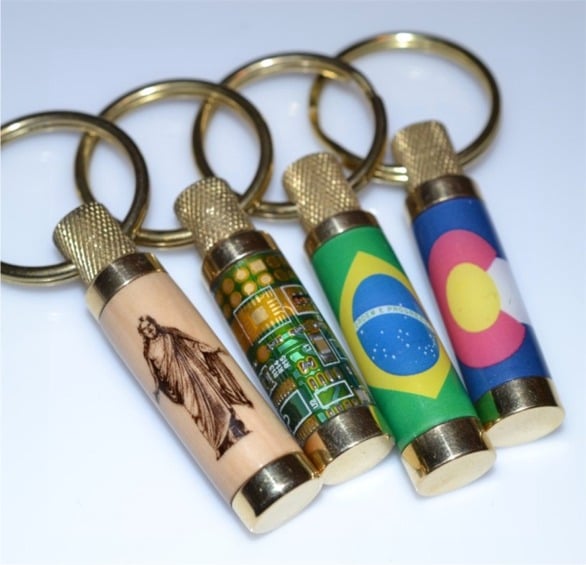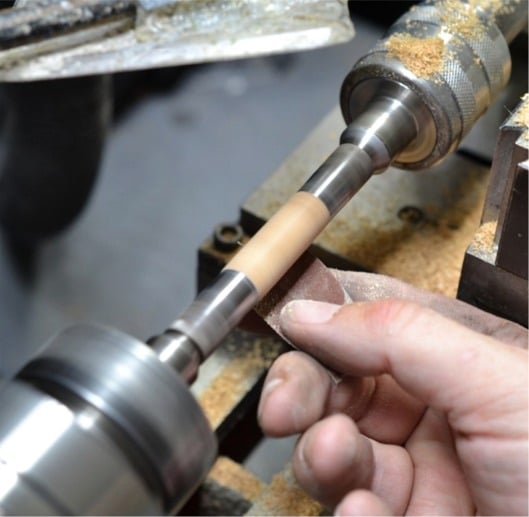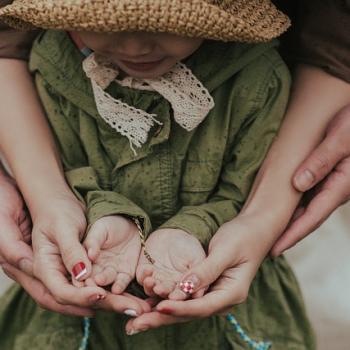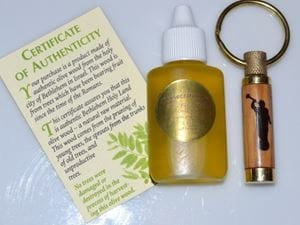
Religion Behind the Scenes spotlights the less discussed, but no less crucial, tasks that keep religious communities running, and the people who make it all happen.
In The Church of Jesus Christ of Latter-day Saints, consecrated olive oil is used in blessing the sick. Of course, that sacred oil needs to be transported to the location of the ill who are in need of a priesthood blessing. Special small oil vials are commonly carried by the ordained in that tradition, seeking to always be prepared should the occasion arise that someone needs a blessing of healing.
For nearly a decade now, Mike Thompson (of BeeHiveFusion.com), has been making practical and yet beautiful oil vials for consecrated oil. In this Religion Behind the Scenes interview, we learn a bit about how Mike got into this work, how he goes about creating his unique designs, and what this sacred work has meant for him over the years.
What’s the purpose of these “oil vials” that you make and why are they important in your tradition?
They are basically containers that hold 100% pure virgin olive oil, which has been blessed or consecrated by someone holding the priesthood. The vials make it convenient for those who are ordained to always have some consecrated oil with them just in case they need to administer a priesthood blessing to someone who has come down with an illness.
Interesting. So what are the vials made of?
Oh, lots of materials. Some are wood, others metal. I actually get olive wood from Bethlehem to make some of them.
How are you able to get Bethlehem wood? There's not a lot of wood in Bethlehem. Is that difficult to acquire?
It sometimes can be, but there are a couple of stores that sell pen kits online, and they’ll sell Bethlehem olive wood for making ballpoint pens. And so we purchase these three quarter inch square by five inch long pieces of wood, and we can turn those down to the size and shape we need them to be.
Are you turning these things on a lathe?
Yeah, I use a metal lathe that I actually got from Harbor Freight, and it works great. I drill the holes in the wood on a drill press. And then we have little tubes that we put into the wood and glue those in place.
Why olive oil for blessings? Is there some symbolism behind that?
Throughout the scriptures, olive oil is used, not just in everyday life (like for cooking), but in religious rituals as well. (See Exodus 29:7; Leviticus 21:10; Numbers 35:25; 1 Samuel 10:1; etc.) There are many kinds of oil, but olive oil was the preferred oil. It was the longest burning, but also the purist oil.
As to the imagery, I think we go back to the symbolism of Jesus Christ. “Christ” means the “Anointed One”—and, when we anoint people with the consecrated olive oil, they are receiving His influence upon them… His influence in their lives (at a very crucial moment in their lives). It helps them to feel a bond to Christ as you bless them. When you’re blessing someone, that olive oil helps them to sense that you are conveying something to them, you are giving them something by placing the physical oil on them.
How long have you been making these oil vials? And what got you into this work?
Well, I started making vials about eight years ago. I was initially making wood pens on a lathe, and then switched over to making the vials.
I was an assistant Scoutmaster at the time, and I wanted to do something kind of cool for the young men who were either earning their Eagle Scout or who were advancing in the priesthood office which they held. So, I originally started making some pen and pencil sets. But then I was looking at some oil vials from a store that sold them, and they were really plain. And I thought, it would be really cool to take that vial and put colors on it or have it a little bit different than others you can buy. And so, it took me about six months or so to try to figure out the whole process. I knew young men who were going out to serve as missionaries in various parts of the world, and I thought, this would be a great gift to give them. So, that’s how I got into it.
You mentioned the plainness of the commercially produced oil vials. You’ve got a lot of variety on your website, BeeHiveFusion.com. How do you come up with the various ideas for these very original designs?
A lot of it, I think, is inspiration. I kind of look at it, thinking, what would I like if I wanted one of these vials for myself? And that inspires me.
Also, pretty much everybody has things that they love or love to do. So, for example, I live here in Denver. So, a vial with the Denver Bronco colors on it made sense. Or something that might appeal to someone who loves hunting, so we made some with an elk on them. Just different varieties, thinking about things people might care about or like. We’ve done a lot with the flags of different countries on them. My wife is from Colombia, for example, and I served as a missionary in Chile. And so, I always thought it might be kind of cool to have an oil vial with a flag from Chile on it, or Colombia, or wherever you’re from or wherever you might have served as a missionary. It is just a little reminder of a place or people that you love and miss.
Very interesting. So you’ve spoken about the inspiration involved in all of this. What do you feel is the most sacred side of your work?
Um, I’ve never thought about that before. But I think the best, the most sacred part, is when I'm able to send out an oil vial and then it is given as a gift to either a missionary or to a father, or to a son. I think that's the most special part. I look at it like, I had a hand in them receiving such a special, handmade, and unique gift from someone they love. That's the most cherished part, for me. I’m not sure that’s “sacred,” but it is special to me.
Of course, what the vials are used for is sacred. I mean, they are used when sick or dying people need a blessing and express the faith to be healed through that priesthood blessing. So, that’s pretty sacred. And though I’m not giving the blessing myself, I’m creating the item that the ordained individual uses to convey that blessing. That means a lot to me.
What aspect of your work would you say you're most proud of? Is it some design you’ve come up with? Or how you figured out how to make these unique vials? Or what?
Oh, I think it’s probably a new design that we came up with. It has solid brass on each end with the Bethlehem wood in the middle. It took me almost a year to design that one.
A lot of the oil vials on the internet are made from a kit. That’s what we did when we first started making them. Most are made by machines, mass produced. But very few of those you can buy online or in a store are handmade. I’m proud of the time and care I put into each one of these. I make them one by one, all by hand, and with attention to detail. I think that’s important.
Do you have any interesting or funny stories about something that’s happened to you over the years as you've been doing this work? Something that struck you or something funny that happened?
One kind of touching one was when a woman approached me and asked me if I could make an oil vial that had a saying engraved on the wood. I told her that I didn’t think that would be a problem. She told me that her husband had recently passed away, and he used to sign notes he would write to their kids, “Love, Dad.” So, she sent me something on which he had written “Love, Dad.” She had two sons who were ordained, and she had me make an oil vial for each of them, with their dad’s note written on it. They had lost their father only six months earlier. So, I thought that was the coolest thing—that they received this gift with a note from their dad on it (in his handwriting). And they can carry that around. It was really a special thing to be part of that, and I know it touched her sons.
I had something funny happen with my dad. I’ve shown him what I do—what I make. He knows about the business. And so, one day he calls me up—he lives in Idaho—and he says, “Mike, you got to look at this guy on the internet. He's selling these oil vials, and they're really good.” So I say, “Oh, well, what's the name?” And he says, “I think it’s BeeHiveFusion, or something like that.” And I go, “Dad! That's me. That's what I do.” Looking at the website, he thought that there was like a big company with a whole bunch of people making these vials. I've told him several times what I do and the name of the business, and I think he just didn't pay attention. So, I got quite the laugh out of that one. Imagine if he called me and said, “I found this guy online who makes these oil vials, and they’re awful!”
What’s the most common thing you run up against, whether positive or negative, in what you do?
I think the positive comes in the form of feedback from people—you know, getting that “Oh, wow! This is great!” comment. Knowing that someone who received one of these as a gift really appreciates it or enjoys it. That means a lot to me and, thankfully, it happens with some frequency.
How has this work changed you for the better? Are there ways in which you feel like doing this has influenced you spiritually in some way?
I think so. A lot of it is the inspiration I feel as I design and make the various vials. I sometimes spend weeks trying to figure out how to create something that is different and unique; something totally original. Wondering, how do I do it? And I’ll sit there and pray about it, and think it through in my head and then, all of a sudden, it will come to me, like a little bit of inspiration. I’ll feel this impression, “do this” or “try this tool.” And then it will work. I kind of learned early on that when I feel something, some impression, I should follow it, I should do it right then, instead of waiting. And I just kind of try and go by the feeling that I need to follow this prompting and get this done, because maybe somebody needs it. I know that sounds kind of corny, but if you follow the Spirit, it really helps. It has made me more Spirit-directed in my life and work.
Are there aspects of what you do that might surprise people?
I think the fact that my oil vials are entirely handmade might surprise some. The only thing that we buy mass produced is the key ring itself. Everything else is 100% handmade. We buy the raw materials, if you will—the wood, the steel, aluminum or brass—and make everything by hand. I say “we,” but it is basically just me. My wife helps here and there, but this is really just a one-man-show.
Is it your sense that the creation of oil vials has evolved over the time—whether that’s in the process of making them or in the nature of the vials themselves?
A little bit. I mean, you see the very basic ones that have been common for decades—steel or brass, with no design on them. And then, later on, you started to see ones made of aluminum with a little design of Jesus Christ on there, or little sayings on them. These are the mass-produced items you find in stores—and they’re all basically the same.
Now you see the little sealed packets of olive oil, and you can carry them in your wallet. Initially I thought, “That’s kind of cool.” But then I began to think, that's kind of wasteful too, because you’ve got to open the package, and then you have to bless or consecrate the oil right then and there, and then you’re prepared to give the blessing. And then you have to get another packet. So, perhaps not the ideal.
When I first started, there were maybe eight or nine oil vials being sold, and they were all basically the same—with a glass insert, and some had olive wood, and others exotic woods (from South America or Africa). And when I started my business, I thought, I’m not going to copy anyone else’s designs. I'll do something completely different. And that's why we came up with the encapsulated metal vial, encased in wood or plastic or other materials. Then we started doing various designs on the outside, like flags or various images. And then, from there, I kind of created my own oil vial, which didn’t have a glass insert which could break, but was solid metal instead.
Perhaps one last question. Is there anything else you think a person who's not a member of your Church should know, as it relates to the oil vials you make?
Well, I think I would just tell them that it's a really incredible thing that we’re able to carry around with us this consecrated oil to give a blessing to someone who is sick or even in fear of death. It is incredible to have the priesthood and to participate in that, and the oil in these vials serves a very sacred purpose. In my Church, it isn’t just the leaders over the entire Church or the leaders over a congregation that are ordained to the priesthood. Most men in each congregation are ordained to the priesthood and can give a blessing. I think a lot of people, when they hear the words “priest” or “priesthood,” assume that’s just one or two people in a congregation. They think of clergy, like in the Catholic Church. But, in our Church, most men pursue priesthood ordination, can give blessings (including blessings of healing), and they will carry with them one of these oil vials so that they always have consecrated oil with them, just in case someone needs a blessing from God. That’s a very special thing.
Interview conducted, transcribed, edited, and condensed by Alonzo L. Gaskill.
ABOUT ALONZO L. GASKILL, PH.D.
Alonzo L. Gaskill is an author, editor, theologian, lecturer, and professor of World Religions. He holds degrees in philosophy, theology/comparative religion, and biblical studies. He has authored more than two-dozen books and numerous articles on various aspects of religion; with topics ranging from world religions and interfaith dialogue, to scriptural commentaries, texts on symbolism, sacred space, and ritual, and even devotional literature.
7/13/2022 10:02:25 PM
